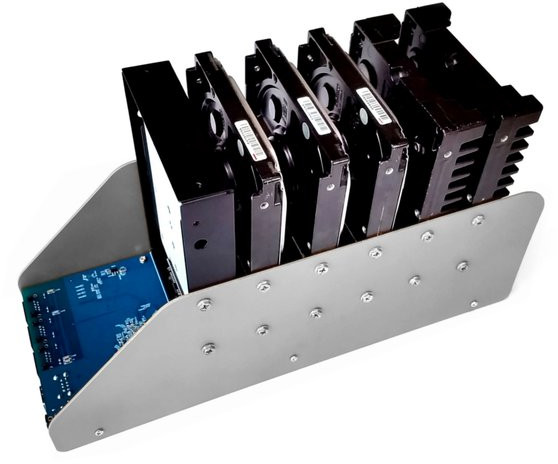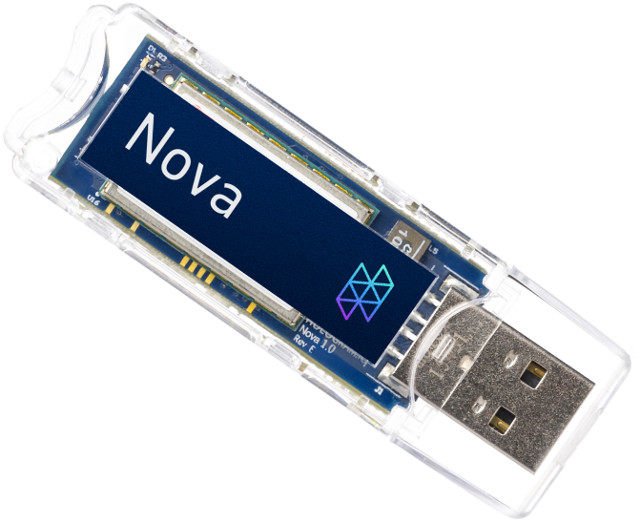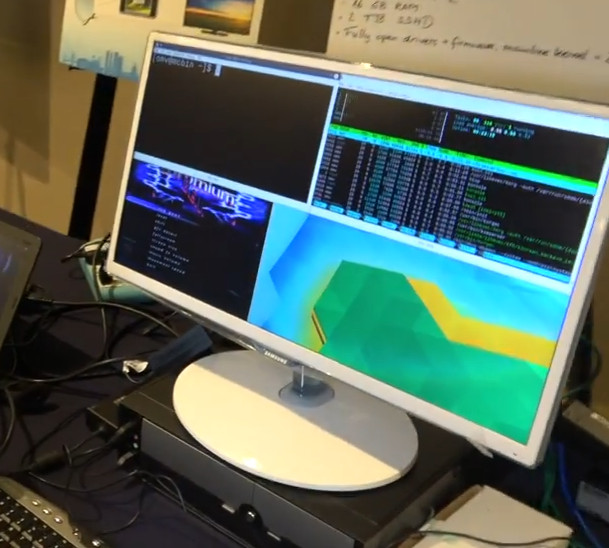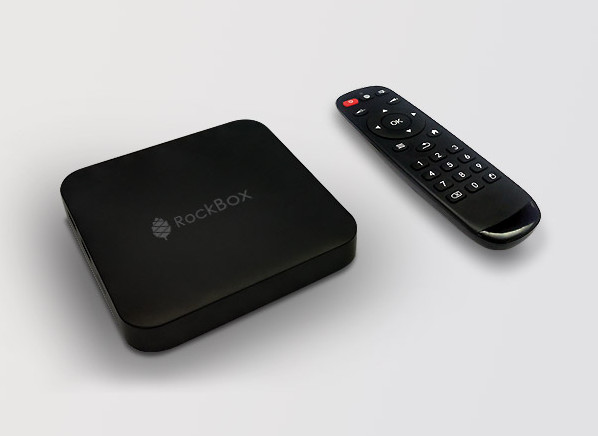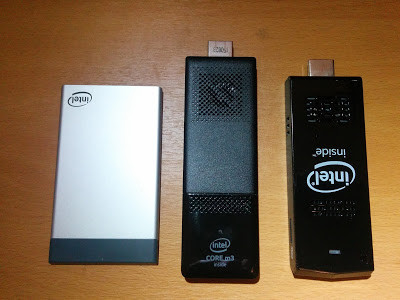GNUBee Personal Cloud 1 is a DIY NAS powered by Mediatek MT7621A MIPS processor that supports up to 2.5″ SATA drives, and runs free and open source software. It was first introduced in March of this year through a CrowdSupply campaign. The developers are now back with GNUBee Personal Cloud 2 (GB-PC2) with pretty much the same features, but instead of being designed for 2.5″ drives, it supports up to six 3.5″ drive that should offer either more capacity, or a lower total price for an equivalent capacity. GB-PC2 NAS specifications: Processor – MediaTek MT7621A dual core, quad thread MIPS processor @ 880 MHz, overclockable to 1.2 GHz System Memory – 512 MB DDR3 (max supported by MT7621) Storage – SD card slot tested up to 64 GB, 6x 3.5” SATA HDD or SSD (recommended RAID 0 or 1 under LVM, MD, or Linux MD RAID 10) Connectivity – 3x […]
Industrial Shields Industrial Panel PCs are Based on Raspberry Pi, Banana Pi, or HummingBoard
Boot&Work Corp., S.L. is a company based in Catalonia that sells industrial automation electronic devices under “Industrial Shields” brand. What makes their product noticeable is that they all appear to be based on maker boards such as Arduino or Raspberry Pi. The company offers various Arduino based PLC modules with or without Ethernet that can be controlled with 10.1″ industrial grade panel PCs based on ARM Linux development boards. Currently three sub-families are available: HummTOUCH powered by Solidrun HummingBoard-i2 NXP i.MX 6Dual Lite board BANANATOUCH with either Banana Pi M64 (Allwinner A64 quad core Cortex A53) or Banana Pi M3 (Allwinner A83T octa core Cortex A7) TOUCHBERRY with Raspberry Pi model B or Raspberry Pi 3 model B Beside the different processors, the 10.1″ Panel PCs share some of the same specifications: Display – 10.1″ resistive multitouch LVDS, 315 nits, 170° viewing angle, 1280×720 resolution Video Input – MIPI CSI […]
Purism Librem 5 Open Source Linux Smartphone Meets its 1.5 Million Dollars Funding Target
Back in the summer, we reported about Purism Librem 5, a privacy-focused, open source Linux smartphone. The hardware has not been developed yet, at the time the company was still considering either i.MX 6 Cortex A9 processor or i.MX8 Cortex A53 processor for the phone, and asked for 1.5 million dollars in their self-managed crowdfunding campaign to get the phone delivered in 2019. The project was interesting but with the current status for the project, amount to be raised, and delivery timeline, it was a long shot. But it turns out there’s some demands for smartphones outside of Android and iOS ecosystem, and since then, KDE and the GNOME foundation have joined the project leading to more coverage & people getting involved, and Librem 5 phone is now fully funded with 13 days to go. The processor will likely be NXP i.MX 8M Quad quad core Cortex A53 SoC, as […]
Hologram Unveils Nova 3G USB Dongle and Python SDK; 200 Raspberry Pi Zero W Kits Given Away to Developers
This summer I discovered Hologram global cellular IoT SIM card, and since they provided free developer samples with 2MB of monthly data includes, I decided to get one to try it out. I received it a few weeks later, and to my surprise it worked, despite my country of residence having some strict requirements with regards to SIM card registration. The SIM card uses roaming, but with a low fixed worldwide pricing, and does not come with a phone number by default, so maybe that’s why I did not have to register. The company is now back with Nova, an open source hardware cellular modem certified by OSHWA (ID #US000077). It’s basically 2G/3G USB dongle that’s controlled by Hologram Python SDK, specifically suited to Debian systems like Raspberry Pi 3 or BeagleBone Black. Hackster.io is also involved in the launch with a worldwide contest offering 200 free kits comprised of […]
Google Adds Home Mini and Home Max to its Google Assistant Family
As we’ve just discussed in our post about Pixel 2 / Pixel 2 smartphones, Google had a hardware day yesterday, where they made announcements about various devices with new smartphones, Pixel Buds earbuds optimized for Google Assistant, Pixelbook chromebook, and so on. Google Home family has also been extended with two new models: Home Mini with a much smaller device and a lower price, as well as Home Max with premium speakers. Google Home Mini Specifications: Speaker – 360 sound with 40mm driver Microphones – “Far-field voice recognition supports hands-free use” Audio formats – HE-AAC, LC-AAC+, MP3, Vorbis, WAV (LPCM), FLAC Connectivity – Dual band 802.11 b/g/n/ac WiFi, Bluetooth USB – 1x micro USB port for power Misc – Play/Pause/Talk button, volume buttons, LEDs, microphone on/off switch Power Supply – 5V/1.8A Dimensions – 98 mm ∅ x 42 mm (h) Weight – 173 grams (device only) Home Mini is compatible with […]
MACCHIATOBin based DIY ARM Desktop, DragonBoard 820c based DIY ARM Laptop (Video)
2017 may be the year of the (ARM based) Linux desktop, sort of. We’ve already seen GIGABYTE ARM development PC powered by a Socionext SC2A11 Synquacer 24-core ARM Cortex A53 processor that will be available in December, and apparently working fairly well already. But there are even more options, as Bernhard Rosenkränzer (Bero) from the Linaro Mobile Group, and unofficial Linaro superstar, has decided to create his own ARM based desktop and laptop, based on respectively MACCHIATOBin board with a Marvell ARMADA 8040 quad core Cortex A72 processor, and DragonBoard 820c board with a Qualcomm Snapdragon 820 quad core Krait processor. Since MACCHIATOBin board complies with mini-ITX form factor, he could simply use off the shelf parts with a standard desktop case with power supply, NVIDIA or AMD Radeon graphics card, 16GB memory modules, and a 2 TB SSD drive. The AMD Radeon card fried due to overheating, so the […]
Popcorn Hour RockBox Basic TV Box To Leverage ROCK64 Board Firmware Images
Pine64 launched ROCK64 development board powered by Rockchip RK3328 processor a few months ago. The board exposes fast interfaces like Gigabit Ethernet and USB 3.0, and support 4K video playback, and runs Android 7.1 or various Linux distributions such as Ubuntu 16.04 and others. Pine64 and Cloud Media companies share some of the same owners, and RK3328 being a TV box processor, it should not come as a surprise that Cloud Media has introduced Popcorn Hour Rockbox Basic TV box based on the processor. While the box is running Android 7.1 by default, it will also be support alternative operating systems such as LibreELEC, Android TV OS, Ubuntu, etc… thanks to the work of Pine64/Rock64 community. Popcorn Hour RockBox Basic specifications are quite standard: SoC – Rockchip RK3328 quad core Cortex A53 processor @ 1.5 GHz with Mali-450MP2 GPU System Memory – 1 GB LPDDR3 Storage – 8 GB eMMC […]
Intel Compute Card and Dock Hands On, Windows 10 and Ubuntu Benchmarks
We’ve recently seen Intel introduced Dock DK132EPJ for their Compute Cards, and released some pricing info. Ian Morrison (Linuxium) got sent a full kit by Intel with the dock and Compute Card CD1M3128MK powered by a dual core / quad Core m3-7Y30 processor with 4GB RAM, 128GB PCIe SSD, and Intel Wireless-AC 8265 module. You can get the full details in Ian’s post, but I’ll provide a summary of the key points here. While the compute card and dock are thinner than most product, the computer card is quite wider than TV sticks, and the dock larger than an Intel NUC. It also comes with a fan, and cooling works well with maximum CPU temperature under being 70°C. The Compute Cards do not come with any operating system, but you get to the BIOS easily, and install Windows or Linux distributions. Ian’s started with Windows 10 Enterprise Evaluation, and ran […]


